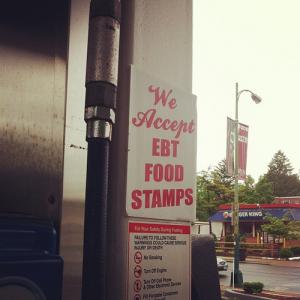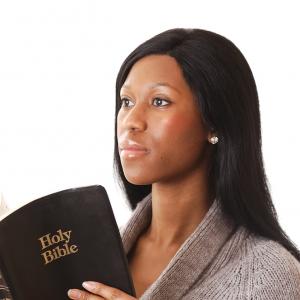Toya Richards Jackson is a licensed Baptist minister from Louisville, Ky. She holds a Master of Divinity degree from Louisville Presbyterian Theological Seminary and is the owner of Grace Multimedia, LLC.
Posts By This Author
My Journey Through Food Stamps
Fear, anxiety, and secrecy marked the roughly year and a half I received federal food stamps.
Like the New Testament’s famed Samaritan woman who snuck to the well at an odd hour to get water, I tried to retrieve the sustenance my family needed outside the view of my immediate community.
I tried never to let those around me see me using the food stamp card, and certainly wouldn’t have ever told my extended family or friends. I wanted no one to know I was living outside the bounds of “acceptable” life.
I had decided to find out whether I qualified for the Supplemental Nutrition Assistance Program (SNAP) while a full-time seminary student trying to raise three teens — one of them in college. I worked jobs as much as I could around my school schedule, but in the end I never had enough money to pay bills, meet my children’s needs, and buy enough groceries for the month.
Called to Lead
More and more African-American women are called to ministry—yet still excluded from the pulpit.
IT IS EASY, and a lot more comfortable, to identify and name dysfunction outside your family. It’s an entirely different endeavor, however, to label inappropriate behavior in your own home.
That’s the situation I find myself in as a lifelong member of the black Baptist tradition—one that, by and large, refuses to ordain women ministers and call them into the pastorate. I can no longer keep silent. My spirit won’t let me be quiet about a system where injustice is nurtured.
Women are the backbone of African- American Baptist congregational life, yet they traditionally have been blocked from ordained ministry. I’ve watched this for years in Kentucky where I was born, raised, and currently live; experienced it in other places where I have resided; and heard the same story from Baptist female colleagues in ministry around the country. The same is also true in many white Baptist congregations, such as those affiliated with the Southern Baptist tradition. But I’m speaking here about the world I know personally.
Ironically, some of these black congregations and pastors who are unwilling to honor God’s call on the lives of women seeking ordination are the same ones who are quick to name a plethora of injustices perpetrated against black people as a race, and to demand quick resolution.
Doors for women called to preach the gospel of Jesus Christ have opened a little in recent decades. More women are being licensed, the precursor to ordination in the Baptist structure. But the process usually stops there, and women are left patiently waiting to be blessed into the fold. These “ladies in waiting” are allowed to lead ministries, teach, and occasionally preach, but rarely permitted to go beyond that.

